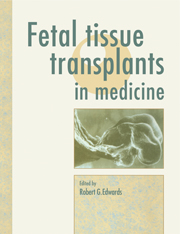Book contents
- Frontmatter
- Contents
- List of contributors
- Preface
- 1 Differentiation and transplantation of embryonic cells in mammals
- 2 Organogenesis and central nervous system development
- 3 Experimental human hematopoiesis in immunodeficient SCID mice engrafted with fetal blood-forming organs
- 4 Ontogeny of human T- and B-cell immunity
- 5 The procurement of human fetal tissues for clinical transplantation. Practice and problems
- 6 Transplantation of fetal haemopoietic and lymphopoietic cells in humans, with special reference to in utero transplantation
- 7 The biology of fetal brain tissue grafts: from mouse to man
- 8 Clinical results of transplanting fetal pancreas
- 9 The suitability of fetal and infantile donors for corneal transplantation
- 10 Transplantation of ovaries and testes
- 11 Cell grafting and gene therapy in metabolic diseases
- 12 The low temperature preservation of fetal cells
- 13 Law and ethics of transplanting fetal tissue
- Appendix: Code of practice on the use of fetuses and fetal material in research and treatment
- Brief bibliography on various aspects of transplanting fetal 337 tissue
- Index
5 - The procurement of human fetal tissues for clinical transplantation. Practice and problems
- Frontmatter
- Contents
- List of contributors
- Preface
- 1 Differentiation and transplantation of embryonic cells in mammals
- 2 Organogenesis and central nervous system development
- 3 Experimental human hematopoiesis in immunodeficient SCID mice engrafted with fetal blood-forming organs
- 4 Ontogeny of human T- and B-cell immunity
- 5 The procurement of human fetal tissues for clinical transplantation. Practice and problems
- 6 Transplantation of fetal haemopoietic and lymphopoietic cells in humans, with special reference to in utero transplantation
- 7 The biology of fetal brain tissue grafts: from mouse to man
- 8 Clinical results of transplanting fetal pancreas
- 9 The suitability of fetal and infantile donors for corneal transplantation
- 10 Transplantation of ovaries and testes
- 11 Cell grafting and gene therapy in metabolic diseases
- 12 The low temperature preservation of fetal cells
- 13 Law and ethics of transplanting fetal tissue
- Appendix: Code of practice on the use of fetuses and fetal material in research and treatment
- Brief bibliography on various aspects of transplanting fetal 337 tissue
- Index
Summary
THERE HAS BEEN A RECENT RENEWED INTEREST in the USe of human fetal tissues for clinical transplantation. At present this use is small in comparison to use in research. However, provided that the ethical and moral concerns of society can be resolved, the potential for medical benefit is considerable.
The procurement of human fetal tissues for transplantation and research are essentially similar, except that, for the former, steps should be taken to ensure the safety of the tissues for the recipient. Only the principles of procurement can be covered in this general article which is largely based on fourteen years of the author's practical experience in acting as an intermediary in the procurement of and working with human fetal tissues. It must be emphasized that any views expressed are those of the author. The ethical and legal requirements discussed are those which are currently in force within the United Kingdom at the time of writing.
For the purposes of this article the definition of human fetal tissue transplantation is taken as the transplantation of tissues or cells from a human fetus into a human recipient for therapeutic purposes. Although pregnancy may be regarded as a form of naturally occurring embryo transplant, the intrauterine implantation of human embryos derived from in vitro fertilization techniques is not included under this definition. With the possible exceptions of human fetal donor thymus transplantation and adult donor bone marrow transplantation, the essential difference between adult organ and fetal tissue transplantation is that adult organ transplantation aims to replace a nonfunctional organ with a like but fully functional mature organ, whereas fetal tissue transplantation aims to transplant immature tissues or cells which have the potential to grow and mature within the host. There is a lack of consistency in the definitions of embryo and fetus that are used in the embryological literature and those used in ethical and legal documents. However, since the use of fetal tissues in clinical transplantation in the United Kingdom comes within the remit of the recommendations of the Polkinghorne Report (1989), the definition of fetus used in this article is taken from that Report and covers the period of development from implantation until term.
- Type
- Chapter
- Information
- Fetal Tissue Transplants in Medicine , pp. 129 - 154Publisher: Cambridge University PressPrint publication year: 1992



